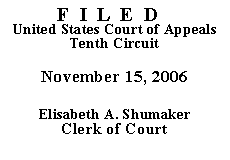

| DESMOND E. OGBEDEAGU,
Plaintiff-Appellant, v. AUTOLIV ASP, INC., Defendant-Appellee. |
|
Mr. Ogbedeagu's suit alleged that Autoliv unlawfully discriminated against him on the basis of race, retaliation, and his membership in the military when it terminated his employment. For its part, Autoliv claimed that he was terminated along with another 185 Denver-area workers as part of a reduction in its workforce.
Autoliv filed a motion for judgment on the pleadings, or in the alternative to dismiss, because of Mr. Ogbedeagu's failure to respond to or participate in discovery. Thereafter, the magistrate judge notified the parties of his intention to treat the motion as a motion for summary judgment.
After a review of Mr. Ogbedeagu's response, the magistrate judge issued a well-reasoned and comprehensive recommendation to grant summary judgment in favor of Autoliv and dismiss the complaint with prejudice. The magistrate's recommendation discussed the admitted facts and correctly applied the law to each claim.
Following de novo review, the district court accepted the magistrate judge's recommendation, and entered an order granting the motion for summary judgment and dismissing the complaint with prejudice. Later, the court denied Mr. Ogbedeagu's motion to proceed in forma pauperis on appeal, finding that the appeal is "not taken in good faith because [he] has not shown the existence of a reasoned, nonfrivolous argument on the law and facts in support of an appeal." Aplee. App., Vol. 2 at 504.
We review the district court's grant of summary judgment de novo, and view the evidence and draw the reasonable inferences therefrom in the light most favorable to the nonmoving party, Mr. Ogbedeagu. Gossett v. Okla. ex rel. Bd. of Regents for Langston Univ., 245 F.3d 1172, 1175 (10th Cir. 2001). Summary judgment is proper if there are no genuine issues of material fact and the moving party, Autoliv, is entitled to judgment as a matter of law. Id.
Because Mr. Ogbedeagu appears pro se, we construe his pleadings liberally. See Neal v. Lewis, 414 F.3d 1244, 1247 (10th Cir. 2005). But because his brief contains nothing more than conclusory allegations of error, and lacks any citations to the record or legal authority, he has waived his right to appellate review. See Garrett v. Selby Connor Maddux & Janer, 425 F.3d 836, 840-41 (10th Cir. 2005).
Setting aside the deficiencies in Mr. Ogbedeagu's brief, our review of the record convinces us that the magistrate judge and district court correctly applied the law to the undisputed, material facts. Therefore, for substantially the reasons set forth by the magistrate judge in his recommendation of August 18, 2005, and by the district court in its order of October 13, 2005, we AFFIRM the grant of summary judgment and dismissal of the complaint with prejudice.
In addition to his appeal from the district court's order of summary judgment, Mr. Ogbedeagu has renewed his motion to proceed in forma pauperis on appeal, and has also filed a motion for sanctions against Autoliv based upon its request for an extension of time to respond to his opening brief. We DENY the motions for sanctions and to proceed in forma pauperis, and he is responsible for immediate payment of any unpaid filing fees.
Entered for the Court
District Judge
*. After examining the briefs and appellate record, this panel has determined unanimously that oral argument would not materially assist the determination of this appeal. See Fed. R. App. P. 34(a)(2); 10th Cir. R. 34.1(G). The case is therefore ordered submitted without oral argument. This order and judgment is not binding precedent, except under the doctrines of law of the case, res judicata, and collateral estoppel. The court generally disfavors the citation of orders and judgments; nevertheless, an order and judgment may be cited under the terms and conditions of 10th Cir. R. 36.3.
2. The Honorable Wesley E. Brown, Senior District Judge, District of Kansas, sitting by designation.